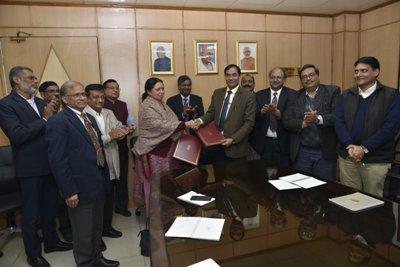NEW DELHI, 15 January 2019 : In order to leverage the efforts, the Department of Biotechnology (DBT) and Indian Council of Agricultural Research (ICAR) has entered into Memorandum of Understanding (MoU) for much-needed emphasis on multi-disciplinary R&D activities and nurturing innovations in Agricultural Biotechnology Research and Education.
Highlighting the importance of the MoU, Secretary DBT, Mrs. Renu Swarup said that five to ten focused programmes both short, medium and long term will be developed and implemented.
Under the agreement ICAR and DBT will form mutual collaboration to explore the possibility of cooperation, convergence and synergy to promote and accelerate the progress of research and training in various disciplines of agricultural biotechnology between ICAR and DBT.
The MoU will be implemented with the aim to collaborate with one another in mutually agreed-upon research programmes in the areas of agricultural biotechnology, funding of projects, policy issues, regulatory aspects, and other specified areas of National interest.
The secretary informed that major facilities and technology platforms created by both the agencies will be accessible to the National systems and a joint working group will be constituted to take the partnership forward.
DBT has undertaken several activities and programs to promote Biotechnology Research & Development in the areas of Agriculture Biotechnology.
Whereas, ICAR has been coordinating, guiding and managing research and education in Agriculture including horticulture, fisheries and animal sciences in the entire country.
The collaborations also encompass to promote agri-innovations and start-ups, through the well established BIRAC mechanism. This flagship synergistic approach would be taken-up in mission mode through networking with the elite institutions in the Country.
The specific objectives are to plan and implement jointly the mutually agreed major National programmes through joint funding and sharing of resources in the priorities areas of agricultural biotechnology; to form common think tank of experts from ICAR and DBT and others to formulate policies; to establish National platform/centres for services related to genomics, genotyping, data banking, agriculture bioinformatics, GM food detection, validation of technologies such as vaccines, diagnostics of veterinary/ fisheries use, molecular markers in crop and animal breeding; to formulate and introduce courses/training programmes in the area of IPR, biosafety, biodiversity conservation and germ plasm exchange, genomic selection and breeding for faculty and students through appropriate mechanisms and; research prioritization with other ministries and foreign collation like Indo-UK SIC, BRICS, African countries and ‘Look East’ programme in relation to agricultural biotechnology.




















